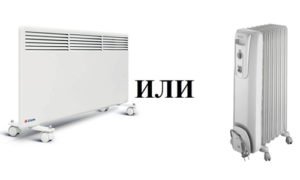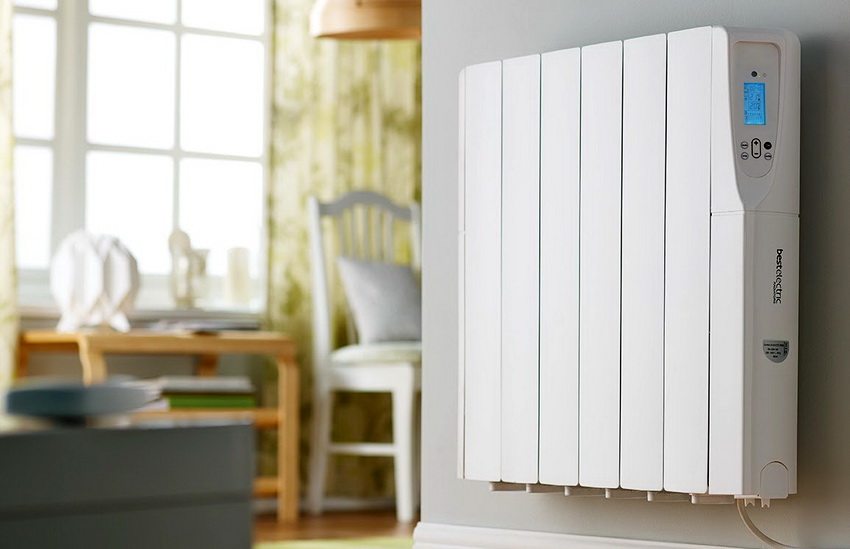 Which is better - convector or oil heater? With the onset of autumn, more and more people are thinking about buying a heater, because I want to come to a warm, cozy house, and not to a raw, cool apartment. Before central heating works, family members will freeze in their own apartment, suffering from a lack of heat and dreaming of the beginning of the heating season. A correctly selected heating device can solve this problem.
Which is better - convector or oil heater? With the onset of autumn, more and more people are thinking about buying a heater, because I want to come to a warm, cozy house, and not to a raw, cool apartment. Before central heating works, family members will freeze in their own apartment, suffering from a lack of heat and dreaming of the beginning of the heating season. A correctly selected heating device can solve this problem.
Content
The principle of operation of convector and oil heater
A convector or convection heater is an electric heater operating on the principle of convection - a heat wave emanating from a heating source and absorbing air. According to the laws of physics, cold layers are more dense than heated streams. When in contact with each other, the heated air is pushed up, and the cold air goes down. Due to the fact that gaseous substances, which include air, are bad heat conductors, the layers do not mix with each other. They constantly circulate inside the heated room, constantly replacing the cold layer with the heated stream coming from the convector.
The principle of operation of a convector heater is as follows: a heating element that is electric (heating element), water or gas, radiates thermal energy to the surrounding space. In order not to harm humans and furniture, the heating element is placed in a housing with a heating indicator, screen and control buttons. At the junction of the housing with the heating element there are slots for the exit of hot flows and the entrance of cold air. Also, to maintain a constant temperature inside the device, there is a thermostat that prevents the body from taking heat. Varieties of convector heaters include:
- Electric. The principle of operation is the transformation of electric energy into the energy of heat transmitted when passing through a heat source - an electric spiral, a monoblock. For a greater heat transfer coefficient, the design provides for the presence of heat transfer plates that increase the area of thermal radiation.
- Water. Heat conductors are tubes with water inside the housing, connected to a heat exchanger.
- Gas. Heating is due to the operation of a gas burner located in a separate insulated chamber. Through the coaxial chimney, cold air enters from the room, inside the body receives heat coming from a cast-iron or steel heat exchanger. Heated air through the grill, which simultaneously serves as protection against burns, enters the room.
- Fan heaters. Warming up is carried out due to the forced movement of warm air, dispersed by the fan blades. Heats large rooms quickly, but consumes a lot of electricity.
Type of convector depends on the area of the heated room and the characteristics of the house. So, a gas convector cannot be installed in an apartment of a multi-storey standard building, but in a private two-story building it will be the most efficient and economical. The most popular models - with an electric heat source, are universal and easy to install both in residential buildings and in offices.
Distinctive feature oil heater - the presence of an intermediate coolant - oil.
Otherwise, the principle of operation does not differ from a convector heater. Inside the appliance there is a heating element that heats the oil to a boil, which transfers heat to the metal casing, which radiates heat fluxes outside.The device has a timer that turns off the consumption of electricity when the oil is sufficient to heat the temperature. Then, as the oil cools, the heater turns on again. Depending on the selected operating mode, the intensity of heat radiation is regulated. To speed up warming up, some models are equipped with a heat ventilation function.
Comparison of the advantages and disadvantages of both devices
The characteristics of the heater are disclosed by describing the advantages and disadvantages. The advantages of oil and convector heaters include the following:
| Convector | Oil |
| + has a wide range of sizes, models and configurations, suitable for any room | + safety, heating elements are hidden inside the case |
| + thermostat allows you to maintain a constant temperature in the room | + wear resistance, elements of the device do not burn out during continuous operation |
| + quickly heats the room | + saves energy, as has a timer |
| + there are wheels and handles for transportation | + light weight |
| + easy to repair in case of breakage | + does not “burn” oxygen, can be installed in a children's room |
| + protective case prevents burns | + will not cause fire if dropped |
| + protection against increased humidity in the room | + works quietly |
| + additional options allow you to control remotely | + does not emit smell of burnt dust |
| + keeps air humidity normal |
As a complex mechanism, in addition to advantages, heaters have certain disadvantages.
| Convector | Oil |
| - consumes a lot of electricity | - overall and massive |
| - dries and burns air, emits an unpleasant odor during operation | - heats up for a long time due to heating the oil to a boiling point |
| - noisy due to thermal expansion of metals | - works only from the mains, not suitable for summer cottages, where there are power outages |
| - tena often break and require replacement | - costs more than convector heaters |
| - based on the principle of operation, there is a difference in temperature between the air at the bottom of the room and under the ceiling | - the child may get burned by touching the body of the device |
| - heats up for a long time | - in case of breakdown, repairs will be expensive |
| - convection principle raises a lot of dust | - installed only on the floor |
Which warms better - oil or convection appliance
To choose a suitable device for heating, consider how much space you need to heat, and the degree of heater load. The comparative characteristic of the oil and convector heater is as follows:
- if the device will work continuously, it is better to choose a model in oil, because it is less damaged, does not burn air and raises dust less;
- when heating is necessary for a short period (while working in the office), a convector heater is more suitable due to instant heating of air and circulation of flows in a small room. But with prolonged use, oxygen deficiency and excess dust will be felt.
What is more economical to use
In terms of energy saving, if we compare convector and oil devices of the same power, they have the same power consumption. But due to the temperature regulator in the oil-type device, which turns off when the oil is heated, the cost of electricity will be lower.
For a house with large rooms, it is better to choose a convection device equipped with a water or gas heater. He quickly warms up a large room and will maintain a comfortable temperature without high financial costs.

What is safer for family and home
In terms of safety, wall-mounted convector heaters are the safest. They are attached to the wall under the ceiling, there is an insignificant chance that the device will fall down. Portable types of heaters are dangerous because a small child puts fingers in the case or can turn the unit over.
Oil heaters have a large heating surface, and due to negligence, children get a burn by touching it. Convector electric heaters become dangerous in rooms with high humidity. Touching a metal case, a person receives an electric shock. With such a heater, you need to take care of grounding yourself.
Conclusion: it is preferable to choose oil heaters for residential premises where people live constantly. They are silent, clean and maintain a comfortable temperature all the time. To heat large areas, it is economically feasible to purchase convector heaters with a water or gas heat source. Floor and wall models are suitable for offices and offices. Electricity costs are directly dependent on unit power and the presence of a temperature controller.
